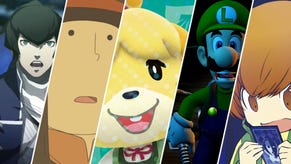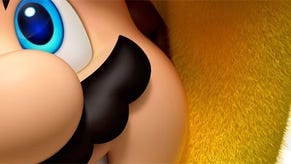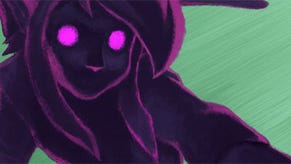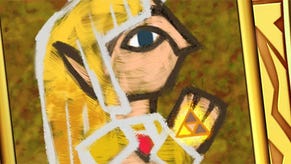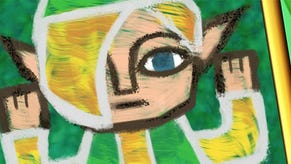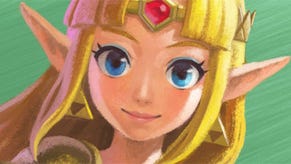2013 In Review: The Legend of Zelda Told Me to Get Lost
How A Link Between World's focus on player freedom created the best installment in years.
This article first appeared on USgamer, a partner publication of VG247. Some content, such as this article, has been migrated to VG247 for posterity after USgamer's closure - but it has not been edited or further vetted by the VG247 team.
Halfway through A Link Between Worlds, something astounding happened: I had absolutely no idea what to do next.
In our high-stakes, gargantuan-budget world of game development, the slightest hint of player confusion typically yields all manner of arrows, blinking dots, or unsolicited assistance from irritating "helper" characters to ensure the interactive experience isn't hampered by too much input on your part. But instead of panicking, throwing my 3DS into a roaring fire, and immediately retiring to the comfortable pay-to-win world of mobile games, I instead used this lack of guidance to explore every inch of Lorule's uncharted territory, in the hopes I'd eventually stumble into my next goal -- while collecting a bounty of treasures and items along the way. I mean, isn't that supposed to be the point of a Legend of Zelda game?
At least, it used to be -- exploration really hasn't been a focus of Nintendo's most esteemed property since 2003's The Wind Waker. The gradual dialing back of The Legend of Zelda's mission statement reached an unsettling crescendo in 2011's Skyward Sword, which, despite its attempts at scope and grandeur, rarely paid lip service to Shigeru Miyamoto's original concept of a little boy lost in a big world. The premise of Skyward entailed that its "levels" would be unlocked one-by-one -- in fact, the game didn't make you aware other areas in the game even existed until your next objective revealed them. This hand-holding nature grew to intolerable levels with the addition of Fi, an obnoxious assistant who makes the shrieking, meme-friendly Navi from Ocarina of Time seem almost like a timid Boo Radley figure in comparison. Nintendo tried to hang a lantern on Fi's intrusive, patronizing advice, but in the end, she still offered an endless stream of unwanted help at every opportunity. Useful for those who didn't know keys open locks, I guess.
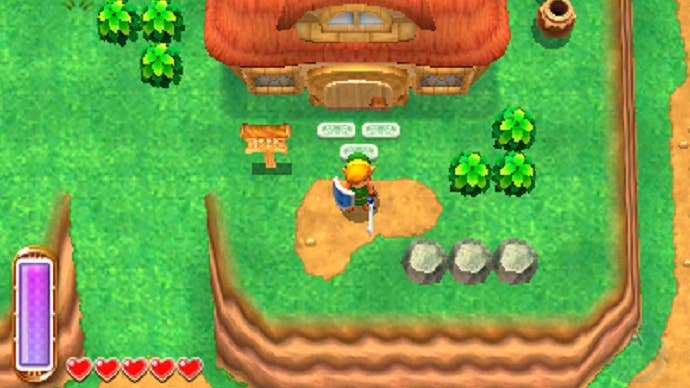
That said, 2011 saw Nintendo in a much different place: still coasting off of the phenomenal sales of the Wii, and with the must-be-a-sure-thing Wii U just a year away from release. Just as the safe, linear quality of Skyward Sword stood as the product of a Nintendo that didn't really need to try, two short years later, A Link Between Worlds came into being from a developer with its back very much against the wall. To be fair, ALBW isn't as out-there and experimental as 2000's Majora's Mask, which retooled the Zelda formula so much that it currently stands as the series' black sheep. Even if you aren't old enough to have nostalgia for A Link to the Past, A Link Between Worlds exists as a remix of what's often considered the best installment in the series, and one of the best games of all time. But this streak of typical Nintendo conservatism allows ALBW to institute some of the most sweeping changes The Legend of Zelda has ever seen.
Rather than plugging new items and characters into The Zelda Template, A Link Between Worlds takes a serious look at the most unnecessary elements of the series, and washes its hands of them entirely. The early parts of any Zelda game often shove hours of obligatory exposition into your lap, and after that, Link slowly sees his arsenal increase one item at a time -- so it typically takes a dozen-or-so hours to turn him into the versatile character he's known to be. A Link Between Worlds understands that being rewarded with the same items for the nth time doesn't carry the same novelty it once did, so, right after a brief opening dungeon, the game gives you access to just about everything Link needs throughout the course of his journey.
Because of this change, the game can immediately focus on throwing puzzles in your path which rely on the use of said tools, which makes for some extremely effective dungeons. Since you enter each dungeon with the item that would have been typically found inside of it in past Zelda games, these areas can now focus entirely on the use of these tools, instead of devoting half of their real estate to tracking them down in the first place. This results in much smaller dungeons, but ones where each and every room puts your puzzle-solving skills to the test.
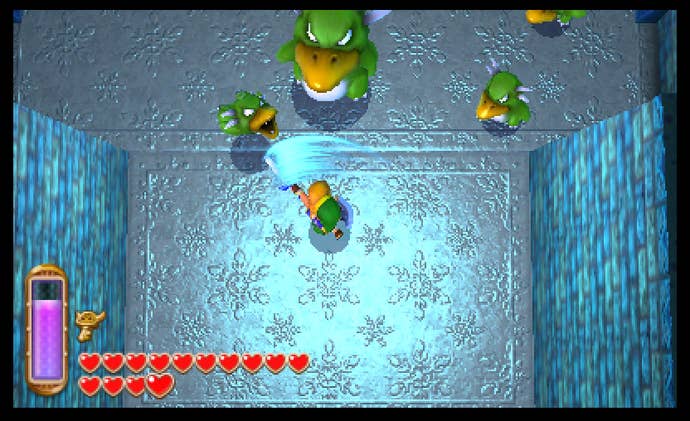
Of course, the most monument change to A Link Between Worlds is one that really hasn't been seen in a Legend of Zelda game since A Link to the Past. In fact, ALBW's hands-off treatment feels even more like a throwback to the series' 1986 debut, which also allowed players to take on dungeons in any order they chose -- provided they could survive the fearsome enemies within. While A Link Between Worlds marks these locations on your map, reaching these areas and even opening up the dungeons isn't as simple as reaching their respective red Xes. Instead of being prodded along by insecure game design, being unable to reach or even open these dungeons doesn't result in assistance; A Link Between Worlds trusts that you understand its world is full of lots of attractions, so a stumbling block only means the opportunity to focus on another objective, or simply wander aimlessly. It's all too rare to see a game content to let you make your own fun.
A Link Between Worlds might have given the Zelda series the shake-up it needs to stay relevant and interesting, but this doesn't mean the series will inevitably continue down this path. For all we know, this portable Zelda could stand as an aberration, and the Wii U's HD Zelda could very much be in the works. In a perfect world, though, Nintendo would take what they learned from A Link Between Worlds, and give us another game that focused on player freedom -- minus the familiarity of a decades-old structure, of course. Just as I thought I'd outgrown the Zelda series, a Link Between Worlds pulled me back in -- and if the next Zelda doesn't let me get lost, it might just lose me entirely.

